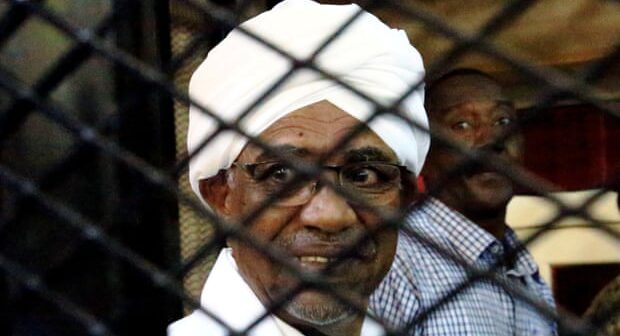Omar Al Bashir, the former president of Sudan, has been sentenced to two years in detention after being found guilty of corruption, receiving illegal gifts and possessing foreign currency.
Bashir has been in prison in Khartoum since being forced from power in April when security forces withdrew their support for his repressive regime after months of protests.
A judge in the capital ordered the confiscation of millions of euros and Sudanese pounds found in Bashir’s residence when he was ousted but said the 75-year-old would be sent to a reform facility, rather than a prison, on account of his age.
The sentence was immediately criticized as too lenient by pro-democracy campaigners, who said they would be organizing protests on Sunday.
Dressed in traditional white robes and a turban, Bashir watched silently from inside a metal defendant’s cage while the judge read out the verdict on Saturday.
Several other judicial cases have been launched in Sudan against the former president. In May, the former ruler was charged with incitement and involvement in the killing of protesters. Last week he was also summoned for questioning over his role in the 1989 military coup that brought him to power.
Sulaf Baloul, whose father was executed by Bashir in 1991, said he was pleased by the verdict. “It’s good that he will feel the humiliation and has to pay back the money he stole from the Sudanese people. But, as families of the martyrs, we will only feel relieved when he is sentenced to death,” Baloul said.
A demonstration in front of the courthouse in Khartoum drew several hundred supporters of Bashir and many members of the former dictator’s party, the National Congress (NCP).
Mohamed El-Fatih, 27, said he respected the Sudanese judicial system but felt the verdict was wrong. “The judge ignored all the evidence presented by the defence team. I am optimistic that he will be free when they appeal the decision,” he said.
Few in Sudan had expected to see Bashir appear before judges, and members of his legal team, including almost 100 lawyers, were optimistic the court would throw out the charges. A key priority for pro-democracy campaigners in Sudan has been bringing former members of Bashir’s regime to justice.
The Sudanese authorities have refused to hand over Bashir to the international criminal court in The Hague, which has accused him of criminal responsibility for war crimes, crimes against humanity and genocide after the killing, maiming and torture of hundreds of thousands of people in Darfur.
The UN estimates 200,000 to 400,000 people died in the conflict and a further 2.7 million were displaced. Militia formed and directed by Bashir are blamed for the worst atrocities.
Sudan is ruled by a government and an 11 member sovereign council,which includes pro democracy campaigners and senior soldiers. These transitional authorities are due to hold power for just over three years before elections.
Last month,the government moved to dissolve the former ruling party and repeal laws used to regulate women’s behaviour under Bashir.
Analysts said the implementation of the measures would be a crucial test of how far transitional authorities were willing or able to go to overturn the legacy of Bashir’s bloody rule. The law to dissolve Bashir’s NCP was described by officials as a means to dismantle the former regime.
The NCP was founded in 1992 and ruled until Bashir left power. Heavily influenced by the Muslim Brotherhood Islamist movement, the party promoted the imposition of a rigorous interpretation of Islamic law in Sudan.
During the corruption trial, it was revealed that Bashir told investigators she had received $90m (£73.8m) in cash from Saudi Arabia for personal use.
The revelations of Saudi support reinforced fears that Gulf states have been seeking to advance their interests through secret deals with rulers and key power brokers in Sudan. The Sudanese military has strong ties to the Gulf monarchies, having assisted in the Saudi-UAE war in Yemen. Guardian



